Bozcaada: the Turkish island where time gave up
I stopped writing love letters a long time ago. Perhaps I stopped falling in love. Yet here I sit, foolish with infatuation, attempting this torturous art form again.
The problem is she's clouding my thoughts.
I first saw her from the top deck of a Turkish ferry; the swell of salt and seaweed scented the breeze and the sea's spittle shone on the superstructure. Seagulls sailed beside us, using the ship's slipstream to steer across the Aegean Sea.
Romantics would say the skies were a striking blue, but they weren't. They were gruff with cloud that greyed around the edges. Still, it was warm and I was enjoying watching her appear on the horizon.
I wasn't enraptured instantly (that's often lust not love), but with the very west of Turkey disappearing back beyond the humming din of the ferry's engine, and the linkspan caressing its way ashore, Bozcaada certainly had me intrigued.
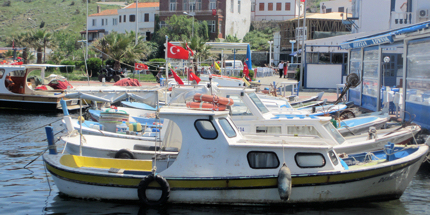 Boats sit in the sun near Bozcaada port
Boats sit in the sun near Bozcaada portDaniel Fahey
Maybe it was the sun-bleached boats nodding off in her port or the white houses wearing terracotta hats that sat scattered across her slothful hills, but she held a fluttering innocence. Her tan turreted fort, resting on a rosemary rump behind her port, suggested her past wasn’t entirely angelic, though. I liked that. It meant she would have stories to share; everyone in Turkey does.
It was on the seaside terrace of the Sehir Restaurant, over soft, freshly grilled fish and golden beer sweating in the sun, that Adem, a guide of Gallipoli battlefields, retold Bozcaada’s prologue. Long ago, when tales passed through generations with words spoken, not written, the island belonged to Greece. It was known as Leucophrye.
According to the mythology of these parts, Tenes, the son of Cycnus, had rejected the advances of his stepmother, Philonome. Pained, she accused him of rape. Siding with his wife, Cycnus banished Tenes from his kingdom, locked him inside a wooden chest and threw it out to sea. Currents took it to Leucophrye, where locals found it washed ashore. They proclaimed Tenes as king and renamed the island Tenedos in his honour.
I digested the tale with a thick Turkish coffee and took to the old cobbled lanes of Bozcaada town. The only full settlement on the island, its streets were peaceful. Traffic seemed long gone. The roads, originally built wide enough for two donkeys to pass one another, hadn't been extended. The sun arrived and dogs laid splayed in the shade. Overripe men drummed dice over backgammon boards. Women in shawls drank çay (tea) on small stools; others swept their front step.
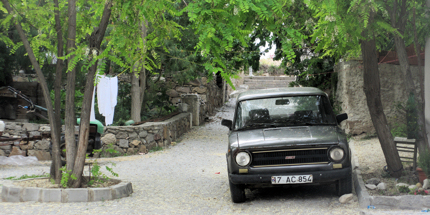 A car keeps cool under the shade of a tree
A car keeps cool under the shade of a treeDaniel Fahey
That's when I started to fall for Bozcaada. Like lovers in the heat of the covers, time ceased as a concept. It fell away, tired of its own being. It served no purpose. I was not the first to notice this. Back in the 5th century, the Greek historian Herodotus thought God created the island so it could bestow long life on those who visited, and wandering around, it was difficult to disagree.
The few cars I found were ancient models; most sat unmoving beneath ageing trees. Bozcaada lured me in with the loss of modern life. I watched fisherman unpick tango nets. Cats and kittens sat and gossiped in the shade; old ladies did too. Pots of homemade jam, plum and orange, were being sold from tables; there wasn't anyone around to buy them.
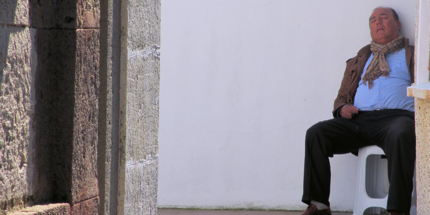 A man snoozes near the Köprülü Mehmet Pasa Mosque
A man snoozes near the Köprülü Mehmet Pasa MosqueDaniel Fahey
I stepped into the shadow of the unassuming Köprülü Mehmet Pasa Mosque for shade and found a slumbering gentleman snoozing in a scarf. I doubted whether he'd wake before the Asr prayer. From here, crows clock the Gallipoli Peninsula just 30km (18 miles) to the north east. During the horrors of WWI, among the Gallipoli trenches and blood-soaked soil, the cigarettes and fear, the Allied Forces would applaud the Ottoman army when they prayed aloud. They thought they were singing.
Only the invisible skylarks serenaded the spring air towards the far end of town. There were bicycles to rent where a tractor turned towards a farm. I hired one from the attendant under the parasol and followed paths that teased towards the coast. They soon dipped back into the countryside.
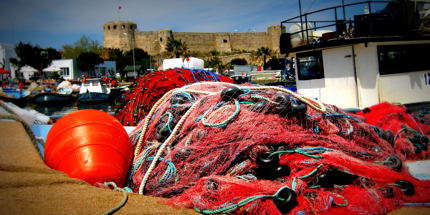 The tango tangled nets of local fishermen in front of Bozcaada fort
The tango tangled nets of local fishermen in front of Bozcaada fortCreative Commons / derya cevik
Locals believe you have to live here to really get a full sense of Bozcaada's majesty, but I was taken aback as I glided past ginger chickens and grazing goats. They say that no two weeks are the same: yellow poppies and thyme and Mexican catchflies and sea daffodils grow and flower, fruit and seed. Stay long enough and you can tell exactly what week of the year it is according to cycle of the flora.
I got to know Bozcaada's curves and contours and crevices from the saddle. I breezed past her vineyards and farms; climbed hills that revealed deserted coves. Eventually I came to Polente Lighthouse, which was white and rough from the Etesian winds. It was as if its decorator had become distracted and simply walked away.
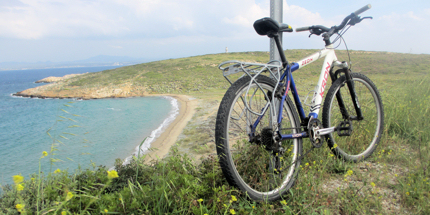 Deserted coves near Polente Lighthouse on Bozcaada
Deserted coves near Polente Lighthouse on BozcaadaDaniel Fahey
The vantage point gave me what I was looking for: great sights over the Dardanelles strait. I knew Bozcaada had secrets but I was stood across from the scene of her greatest: her hand in the conclusion of the Trojan War.
Beyond the denim currents below, rows and rows of olive groves led towards the ancient city of Troy. In a final roll of the astragalus bone (a sheep's ankle which Hades, Poseidon and Zeus used as a gambling die to split the Universe), the great Greek advisor, Odysseus, ordered the army to construct a giant wooden horse and leave it at the gates of the grand city, filled with 30 men.
The rest is popular history, but it was behind this little island that the Greeks hid their ships. So that's why I had to scribble this love letter: I'm a sucker for a siren with secrets, especially one as enticing as Bozcaada.
NEED TO KNOW
Getting there
From the UK, Turkish Airlines (www.turkishairlines.com) fly to Istanbul Ataturk Airport and Pegasus Airlines (www.flypgs.com) fly from London Stansted to Istanbul Sabiha Gokcen. Metro Turizm (www.metroturizm.com.tr) runs direct coaches from Istanbul to Geyikli, where there are ferry connections to Bozcaada. The coach journey takes around seven hours with an overnight option available.
Find out more
Bozcaada Directory: en.bozcaadarehberi.com
Turkish Culture and Tourism Office UK: www.gototurkey.co.uk
Do you have any Feedback about this page?
© 2026 Columbus Travel Media Ltd. All rights reserved. No part of this site may be reproduced without our written permission, click here for information on Columbus Content Solutions.






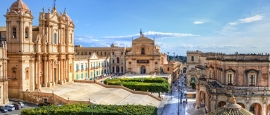


 You know where
You know where